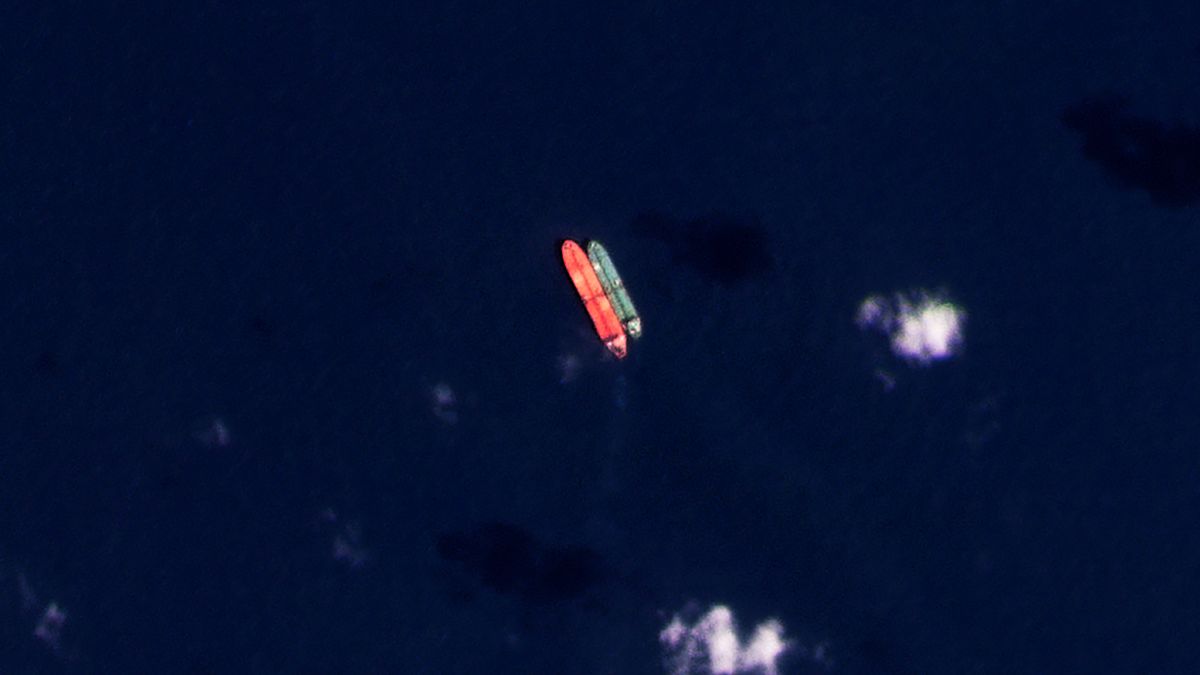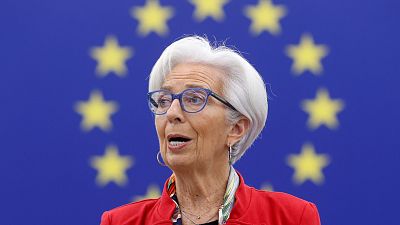The now-public case against Greece's Empire Navigation, which faces three years of probation under the plea agreement, marks the first public acknowledgement by US prosecutors that the US seized some 1 million barrels of oil from the tanker Suez Rajan.
A Greek shipping company has pleaded guilty to smuggling sanctioned Iranian crude oil and agreed to pay a $2.4 million (€2.2 million) fine, newly unsealed US court documents show.
The now-public case against Empire Navigation, which faces three years of probation under the plea agreement, marks the first public acknowledgement by US prosecutors that the US seized some 1 million barrels of oil from the tanker Suez Rajan.
The saga surrounding the ship further escalated tensions between Washington and Iran, even as they work towards a trade of billions of dollars in frozen Iranian assets in South Korea for the release of five Iranian Americans held in Tehran.
The court filings also shed light on the covert world of Iranian crude oil smuggling in the face of Western sanctions since the collapse of its 2015 nuclear deal -- an operation that has only grown in scale over this year.
The US and its allies have been seizing Iranian oil cargoes since 2019. It's led to a series of attacks in the Middle East attributed to the Islamic Republic, as well as ship seizures by Iranian military and paramilitary forces that threaten global shipping through the Strait of Hormuz, the narrow mouth of the Persian Gulf through which 20% of the world's oil passes.
Attention began focusing on the Suez Rajan in February 2022, when the group United Against Nuclear Iran said it suspected the tanker carried oil from Iran’s Khargh Island, its main oil distribution terminal in the Persian Gulf. Satellite photos and shipping data analysed at the time by the AP supported the allegation.
The newly unsealed court documents, seen by the AP, rely on satellite images, as well as documents, to show that the Suez Rajan sought to mask its loading of Iranian crude oil from one tanker by trying to instead claim the oil came from another.
For months, the ship sat in the South China Sea off the northeast coast of Singapore before suddenly sailing for the Texas coast without explanation. The vessel discharged its cargo to another tanker, which released its oil in Houston in recent days. The court documents seen on Thursday confirm the US government seized the oil.
A lawyer for Empire Navigation, Apostolos Tourkantonis, pleaded guilty to a single charge of violating Iranian sanctions. Empire, based in Athens, Greece, did not immediately respond to a request for comment.
A 'mob-like operation'
The US Treasury has said Iran’s oil smuggling revenue supports the Quds Force, the expeditionary unit of the Revolutionary Guard that operates across the Middle East. The Guard is suspected to be closely involved in the trade, involving hundreds of vessels that try to mask their movements and can hide their ownership through foreign shell companies.
But the Suez Rajan case was unique at the time of the transfer because it was owned by the Los Angeles-based private equity firm Oaktree Capital Management. That likely gave American prosecutors an edge in pursuing the case. Oaktree, which has repeatedly declined to discuss the case, sold the vessel fully to Empire in late May.
Mark Wallace, a former US ambassador to the United Nations under President George W Bush who heads United Against Nuclear Iran, praised Empire Navigation for agreeing to the plea. He described Iran's oil smuggling as a “mob-like” operation and urged others to abandon the trade.
“They faced down Iranian assassination threats in Greece,” Wallace told the AP. “They took the off ramp to leave the mob.”
Wallace declined to elaborate, and the US court documents offered no detail on the alleged threat. However, the delay in offloading the Suez Rajan’s cargo had become a political issue as well for the Biden administration as the ship had sat for months in the Gulf of Mexico, possibly due to companies being worried about the threat from Iran.
Since the Suez Rajan headed for America, Iran has seized two tankers near the Strait of Hormuz, including one with cargo for major US oil company Chevron Corp. In July, the top commander of the Revolutionary Guard’s naval arm threatened further action against anyone offloading the Suez Rajan, with state media linking the recent seizures to the cargo’s fate.
Iran has continued to make threats over the seizure and summoned a Swiss diplomat in Tehran to express its anger. Switzerland has looked after US interests in Iran since the 1979 US Embassy takeover and hostage crisis.
Iran's mission to the United Nations did not immediately respond to a request for comment.
Exports continue despite US sanctions
The US Navy has increased its presence steadily in recent weeks in the Middle East, sending the troop-and-aircraft-carrying USS Bataan through the Strait of Hormuz and considering putting armed personnel on commercial ships traveling through the strait to stop Iran from seizing additional ships.
Late Wednesday, the US updated its warning to shippers traveling through the Middle East, saying: “Commercial vessels transiting through the Persian Gulf, Strait of Hormuz and Gulf of Oman continue to be illegally boarded and detained or seized by Iranian forces.”
This year, Iranian oil exports have mostly been above 1 million barrels a day despite US sanctions, according to the commodity data firm Kpler. In May and June, it went above 1.5 million barrels a day, with figures in August sitting at 1.4 million barrels daily, Kpler's data showed. China is believed to be a major buyer of Iranian oil, likely at a significant discount.
“Justice was served,” Wallace said. “At the same time, there needs to be a serious policy review on why it took so long and why there are 300 vessels out there doing the same thing.”



